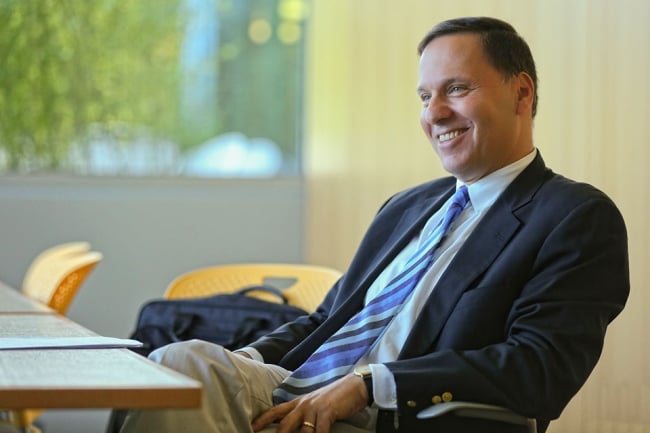You have /5 articles left.
Sign up for a free account or log in.

Ron Liebowitz took over as Brandeis University president in 2016.
Brandeis University
Two days after faculty members at Brandeis University narrowly voted no confidence in their president, Ron Liebowitz announced he’ll step down from the post, effective Nov. 1.
Faculty criticized Liebowitz for fundraising failures and the way he handled a recent budget shortfall, which led to job cuts. Over all, they said Liebowitz has shown a “consistent pattern of damaging errors of judgment and poor leadership,” according to the no-confidence motion.
Liebowitz, who has led the private research university since 2016, didn’t say why he was leaving but noted in a message to the campus community that he does so “with mixed emotions.”
“At the same time, this is a valuable moment for me and for [his wife] Jessica to build on our experiences to create new pathways for innovation and reform in higher education, and I resign knowing that the university will be in good hands,” he wrote.
Arthur E. Levine, a 1970 graduate of Brandeis, will take over for Liebowitz on an interim basis until a permanent president is selected.
Over the course of his eight-year tenure, Liebowitz worked to improve the university’s finances, steered Brandeis through the COVID-19 pandemic and battled publicly with the Board of Trustees over his contract. He also placed “a renewed focus on the university’s Jewish roots,” according to a statement from Brandeis officials. (Brandeis was founded by the American Jewish community in 1948, and a third of undergraduates are Jewish.)
During the last year, as college leaders grappled with how to confront rising campus antisemitism and protests over the Israel-Hamas war, Liebowitz became one of the first university leaders to ban Students for Justice in Palestine from campus—a move that prompted pushback from students and faculty. Several students were also arrested at a protest in November, a move the faculty criticized in their no-confidence motion.
Even so, the Board of Trustees praised Liebowitz’s leadership over the last year in a statement released Wednesday.
“Ron has faithfully championed Brandeis’ core and founding principles,” Lisa Kranc, chair of the Brandeis Board of Trustees, said in the statement. “While many have chosen to stay silent, Ron has had the moral courage to be a leading voice in recognizing that we cannot cower from any form of hatred, especially antisemitism.”
Liebowitz told Inside Higher Ed earlier this summer that Brandeis’s Jewish legacy prompted him to be “bolder” in his approach to the conflict.
But the university has struggled financially recently, despite Liebowitz’s efforts to balance the budget. When he started, Brandeis was in a $35 million hole. That gap has narrowed over the years, but not enough. Brandeis administrators said earlier this year that they were cutting 60 jobs to close an estimated $2 million budget gap and cutting back on doctoral programs. The Boston Globe reported that enrollment at the Massachusetts liberal arts college has dropped by about 9 percent compared to five years ago, and the drop was much greater—about a quarter—among graduate students. Last year, the university closed its music doctoral programs due to budget cuts.
Despite the current financial challenges, trustees said in the statement that Liebowitz “re-energized the university’s fundraising efforts” and “reaffirmed the university’s dual commitment to excellence in its undergraduate liberal arts program and to world class research and scholarship as an R1 university.”
Larry Ladd, a subject matter specialist at the Association of Governing Boards of Universities and Colleges who advises colleges on governance, strategy and finances, said that one challenge for Brandeis is that it doesn’t have the endowment that other highly selective research universities have. In fiscal year 2022, Brandeis’s endowment was valued at $1.2 billion. That’s about $228,902 per student, which puts it between Connecticut and St. Olaf Colleges.
“So it’s not in the galaxy of institutions that it sees itself,” Ladd said. “It’s a highly selective research university, and it has never had sufficient resources to succeed that way.”
The tension between the way Brandeis views itself and its available resources puts pressure on the university president to raise money and make up the difference, Ladd said, adding that “it’s hard to be a president” when the resources are not equivalent to the ambition or identity of an institution.
Leonard Saxe, a professor of contemporary Jewish studies and social policy at Brandeis, agreed that the university doesn’t have the resources to sustain its ambitions. Historically, he said, Brandeis presidents have tended to leave over economic crises; in this case, the institution—like many others—has struggled to recover from the COVID-19 pandemic, particularly after the federal stimulus money stopped.
Saxe added that it was difficult for Brandeis to keep up with the larger shifts in higher education, such as more students focusing not on liberal arts but on disciplines more closely connected to getting jobs. He said that in addition to the loss of the music doctoral programs, there have been “reductions across the board” in social sciences and the humanities.
“Brandeis was making changes that were really tough changes to swallow, but it wasn’t the president’s fault,” said Saxe, who is also the director of the Steinhardt Social Research Institute and the Cohen Center for Modern Jewish Studies.
The last year, he said, has been an especially difficult time for the university, following Hamas’s Oct. 7 attack on Israel and the subsequent war in Gaza. But Saxe said that Liebowitz felt an obligation to speak out about antisemitism and help other college leaders better understand and confront the issue.
He’s sad to see Liebowitz leave.
“Ron has been a great leader and has done some important things in getting the university back on track with its early mission,” he said.




